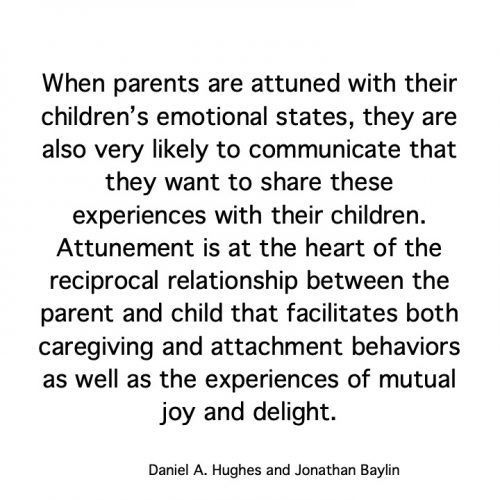Attuning to our child’s emotional and physical needs can really help create the relational enjoyment a parent/child bond needs to be healthy. Becoming more aware of both how we attune and how we don’t can be a wonderful way to improve our parenting skills. By making our attuning more conscious we can make it even better for our child’s emotional and physical development.
What Is Attunement?
Children are highly aware of the messages their caregivers are giving to them. They are picking up any kind of message that says you are good, bad or something else. Children, especially really young ones, are in an incredibly vulnerable position. In order to survive they need to be highly aware of the people who they need to feed and nurture them.
On the other hand, parents need to be aware of their child to make sure a child is getting there needs met. Obviously, this is more necessary in the first 2 years of a child’s life as they learn how to communicate with their caregivers. However, attunement is helpful throughout the developmental cycle. As children grow, up there is less needing to guess the needs of the child, while it shifts to being more emotionally tuned in.
We must be asking ourselves if our child is feeling safe, nurtured, challenged or loved. Parents can do this by making more of an effort to notice how their child is feeling. This means paying attention to the signals kids give to parents. Dragging their feet, sad face, etc. These are ways children will tell their parents that something is wrong without actually telling them. Parents need to learn what the signals are that their kids give when things are not right.
Why Is This important?
When we are attuned to our child’s needs we help them feel safe. When a child is feeling safe they are able to move towards what they need to continue to learn and develop. If a child feels unsafe they may feel that they have to take on some of the roles of the caretaker in order to be okay.
Parents who attune to their children are also able to create healthy attachment bonds.
Susan Stren, in her online article, Attunement, speaks to this really well:
“Attunement and attachment are related. Attachment is an emotional bond to another person. According to psychologist John Bowlby, the earliest bonds formed by children with their parents (caregivers) have an important impact that continues throughout their life. Attunement and attachment are related in that, mothers/fathers (caregivers) who are available and attuned to their child, in other words, responsive to their child’s needs beginning in infancy, establish a sense of security within that child.” (Stern, 2014)
If the goal of parenting is to support our children along their natural developmental process it is really important to help them feel safe on that journey.
How Does Attunement Help Your Child?
When kids feel safe they feel like they can grow and develop. Attuning to a child helps them feel like they are loved and cared for. This allows kids to focus on exploring, walking, socializing and moving on to the next developmental stage.
Neurologically children’s brains are enhanced by feeling the attunement of a caregiver.
In their book, Brain-Based Parenting, Daniel Hughes and Jonathan Baylin explain how this happens:
“Each moment of such attuned affect facilitates the brain’s development and promotes attachment and bonding. Remember, it’s in these moments of attunement that both parent and child are most likely to release oxytocin and to feel “in sync” with one another while also producing growth-enhancing brain chemicals. Attunement builds the relationship by enhancing the functioning of each partner’s brain.” (Baylin, Hughes, 2012).
.
How Do You Do This?
For the most part parents are going to be naturally attuned to their children. However, for some parents picking up their child’s cues an be difficult. Parents get lost in thought while their child is needing something. This is quite natural and part of parenting. The goal is to work on becoming more present with your child so that you can see and learn more about how they communicate.
Becoming more present means becoming more present with yourself. If you are struggling with attunement consider taking on a short mindfulness practice every day. Staring out the day with a few minutes of mindfulness can help shift your day towards more presence. It can help, not only your relationship with your kids, but also everyone who comes into contact with you.
.
Bringing This Into My Life
When I’m with my two boys I find that they are constantly focused on me in order to get a sense if they are safe or not. At times it is fun, and, at other times it can be exhausting. However, there is no way to get around their needs. They need a dad that is willing to make the effort to continually assess their needs and insure their feeling of safety.
I know at times I fail at this because of losing presence or not really having the stamina to stay with them. The important thing I have learned is that even if I fail all the time my boys will still be fine. My intention is to be attuned to them most of the time. When I miss something I try to be patient with myself, knowing how resilient my little guys are.
.
If you are looking to connect deeper with your kids,
please contact me.
References:
Baylin, Jonathan, & Hughes, A. Daniel. (2012). Brain-Based Parenting: The Neuroscience of Caregiving for Healthy Attachment. W.W. Norton and Company. New York, NY.
Stern, Susan (2014, November). Attunement. Retrieved from
http://socialskillsplace.com/archive/1114.newsletter.html
Photo by Kelly Sikkem – Unsplash

